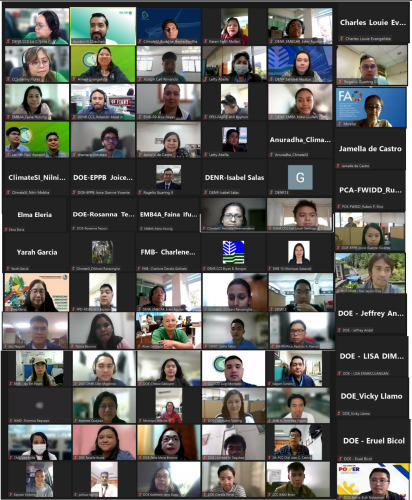A series of webinars were conducted for four consecutive days as part of the In Country Support Activity, in response to a support request from the Philippines.
Background
Greenhouse Gas (GHG) inventories offer valuable insights into the emissions and removals of greenhouse gases from various sources, sectors, and sinks. Once this information is gathered, it becomes possible to identify suitable mitigation actions or policies, develop baseline scenarios, and formulate projections. Furthermore, countries that are parties to the United Nations Framework Convention on Climate Change (UNFCCC) must provide regular reports on their inventories. These reports are included in their National Communications (NCs), which are submitted every four years and updated every two years through the Biennial Update Reports (BURs)/Biennial Transparency Reports (BTRs). The timing and scope of these reports take into account each country's capabilities and the support available to them.
The use of the Intergovernmental Panel on Climate Change (IPCC) guidelines in the estimation and reporting of national GHG inventories is recommended by UNFCCC through various relevant decisions of COPs. The full version of IPCC Guidelines on GHG inventories was released in 2006 and updated subsequently in 2019. The IPCC Guidelines offer a strong framework for countries to accurately report their human-caused emissions and removals of greenhouse gases. These guidelines are crucial for developing national GHG inventories, as they provide valuable insights into the global carbon cycle, support informed policy decisions, and enable effective tracking of progress towards climate goals.
The various components involved in a Greenhouse Gas inventory preparation are essential for maintaining the accuracy, reliability, and credibility of the inventory. These components include data management, quality assurance and quality control (QA/QC), verification, key category analysis, and uncertainty assessment. Efficient data management is crucial for maintaining the organization, storage, and retrieval of data, ensuring the long-term consistency and comparability of the inventory. Implementing QA/QC procedures is crucial for ensuring the accuracy and reliability of the data. By identifying and rectifying errors, these procedures significantly enhance the overall quality of the inventory. The process of verification adds an extra layer of scrutiny to the inventory, making it more transparent and credible. Through key category analysis, we can pinpoint the most important contributors to greenhouse gas emissions. This enables us to concentrate our efforts on enhancing the accuracy of data in these specific areas. The assessment of uncertainty helps to determine the level of confidence in the inventory data, which is crucial for making informed decisions and prioritizing enhancements in the inventory process. The components mentioned work together to create a strong and dependable GHG inventory.
Objective
The primary objective of this webinar is to provide comprehensive training on the IPCC Guidelines for preparing National Greenhouse Gas Inventories. The webinar aims to enhance the understanding and application of these guidelines among the participants, thereby improving the quality and accuracy of national GHG inventories.
